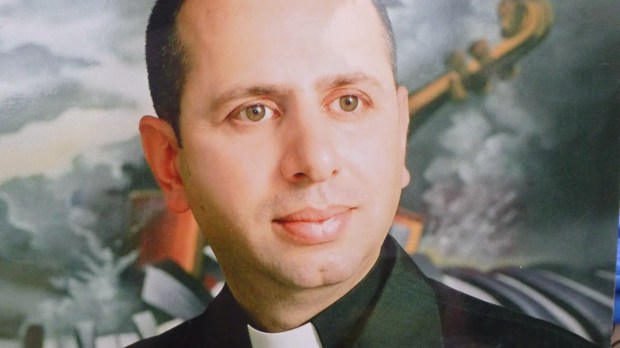Every channel is filled with images of Afghan people seeking help, desperate to leave their country or trying to stay. The news speaks again and again of cities falling to the Taliban, of vengeance wrought on those who had opposed them. And as we sit and watch in horror, there is little most of us can do.
But we can pray. We can pray especially through the intercession of saints who have experienced the agony of a destabilized region, some who even experienced retaliatory violence as a result of U.S. military intervention. Let us pray without ceasing for the people of Afghanistan, begging (through the intercession of these saints) that they be saved.
Servant of God Ragheed Aziz Ganni (1972-2007) was a young Chaldean Catholic priest who had returned to Iraq from studies in Rome shortly after Saddam Hussein’s removal. Fr. Ragheed had voiced his opposition to the U.S. invasion of Iraq, fearing the repercussions it would have on Iraqi Christians. He was right. In the four years he spent as a parish priest in Mosul, Fr. Ragheed’s sister was wounded when a grenade was thrown into a church, a car bomb after Mass killed two Christians, and the bishop’s residence was bombed. Fr. Ragheed’s own parish was attacked at least 10 times, all culminating in a final attack when armed men ambushed and killed Fr. Ragheed along with Servants of God Basman Yousef Daud, and Wahid Hanna Isho and Gassan Isam.
Blessed Marie-Clémentine Anuarite Nengapeta (1939-1964) was born to non-Christian parents in what is now the Democratic Republic of the Congo. She was the fourth of six daughters raised by a single mother after her father walked out on them. In adulthood, Marie-Clémentine became a religious Sister. After the Congo won its independence from colonial rule in 1960, chaos broke out, with Belgium backing various secessionist groups, U.N. peacekeepers being deployed, and the Soviets offering support to various factions. Sr. Marie-Clémentine survived this for four and half years before she and her Sisters were captured by rebel soldiers who were suspicious of their “Western” religion. One of the officers attempted to seduce Sr. Marie-Clémentine; when he failed, his seduction turned into threats of violence, which escalated when another officer attempted to rape her. When Sr. Marie-Clémentine continued to fight off her attacker, he killed her.
Blessed Paul Thoj Xyooj (1941-1960, pronounced Tao Shiong) was a Hmong catechist living in Laos during the Laotian Civil War, in which the United States covertly supported the Royal government against communist forces. When Xyooj and Bl. Mario Borzaga (an Italian priest) were traveling, Xyooj warned Fr. Borzaga of the guerillas’ presence, but Fr. Borzaga insisted they would be safe since he wasn’t an American. But he looked like one to the Laotian communists they encountered, and Xyooj was clearly Hmong (a people who were working with the U.S. military). The two missionaries were captured. Though Xyooj was offered his freedom, he chose to remain with Fr. Borzaga and they were martyred together.
Servant of God Marcel Nguyễn Tân Văn (1928-1959) was a gentle young Vietnamese religious who died in a communist prison camp. He spent much of his childhood in a minor seminary, then entered the Redemptorist order when he was 16. But in 1954, North Vietnam was taken over by communists. Catholics who could were fleeing to the south, but Br. Marcel begged his superiors to let him stay, so that there would be someone who loved God living among the communists. He stayed, but was soon arrested and imprisoned. He was later caught (dressed in women’s clothes) trying to sneak out of the prison camp to get the Eucharist and bring Jesus back to the prisoners. He was placed in solitary confinement and soon died of consumption.
Servant of God Agnes Chang (1910-1950) was a North Korean Benedictine Oblate who was prohibited from professing vows as a fully-professed Sister because she had previously contracted marriage. Though the marriage had been arranged and her husband had been so ill that the two had never consummated the marriage before his death, the custom of the community was that Sr. Agnes could not fully enter. Each time another Sister made vows or celebrated a jubilee, Sr. Agnes was reminded of what felt to her like a second-class vocation. But she faithfully worked as porter, served as a night nurse, and catechized local people, especially old men, until communists took control of their area. Then Sr. Agnes and the others were arrested and ordered to disband. With no family to take her in, Sr. Agnes found work in a brickyard, where she longed for the Sacraments and lived in fear of the communists until she was arrested, imprisoned, and killed.
Blessed Natalia Tulasiewicz (1906-1945) was a poet, a violinist, a middle-aged high school teacher with tuberculosis and dreams of a Ph.D. But when the Germans invaded Poland, Natalia was turned out of her home. Rather than submit to the Nazi attempt to destroy Poland, Natalia became a member of the resistance, secretly teaching Polish culture before sneaking off to a German factory to bring faith and hope to the Polish women forced to work there. The Nazis eventually caught wind of the prayer circles and retreats Natalia was running and sent her to a concentration camp. There she continued to serve as a beacon of hope and an apostle to Ravensbrück until she was killed in a gas chamber.



